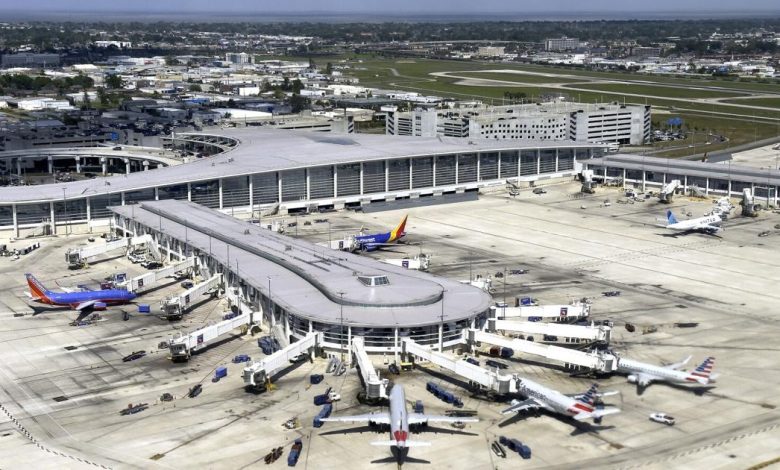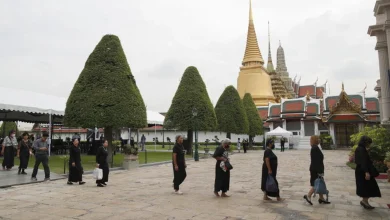Louisiana minority students learn about careers in aviation | Education

The gates and seats of the abandoned southern terminal of Louis Armstrong International Airport became lecture halls and desks on Saturday for over 100 high school students from across Baton Rouge and New Orleans.
The lesson plan: often-overlooked career opportunities in aviation, delivered by industry professionals, airport administrators and record-breaking pilots.
The activities were part of Project LIFT, an educational initiative from the Airport Minority Advisory Council, which is holding its 40th annual airport business conference in New Orleans this week.
Kevin Dolliole, director of aviation for the airport, said when he asks high schoolers about careers in the airline industry, he hears back only two possibilities: pilots and flight attendants.
“We need to open young peoples’ minds to the full umbrella of aviation opportunities available to them,” Dolliole said, surrounded by teenagers doing just that as they learned to put rivets through sheet metal in the hallways of the New Orleans airport’s former terminal.
These are the same rivets that “hold the entirety of an airplane together,” one instructor told the students.
Cleve Dunn Jr., who serves District 6 on the Baton Rouge Metro Council, hosted Project LIFT, introducing speakers and bringing in Capital Region schools to be involved. Dunn has served on the Baton Rouge Metropolitan Airport Commission for over a decade and is also a board member for the Airport Minority Advisory Council.
He said he first became interested in the aviation industry when he worked to add more Black-owned small businesses as vendors at Baton Rouge Metro Airport.
Project LIFT introduces students to lesser-known fields of aviation: aircraft maintenance, airport development, architecture and business operations.
The look at future careers comes as the nation grapples with shortages of air traffic controllers, pilots and aircraft technicians.
“Aviation is going through a massive shortage. We need over 700,000 technicians for the country,” said Barrington Irving, a pilot who broke world records as the youngest pilot to fly around the globe solo and the first Black pilot to do so.
Irving said that if every technical aviation program at every university in the country graduated 100% of their enrolled students, it would still amount to only 11,000 additional techs each year.
Not only that, but workers in the field tend to be older and planning for retirement in the coming years, Irving said.
His two educational programs, the Flying Classroom for elementary students and the BITTS technical training school for high schoolers and older, hope to fill that gap.
“Our students don’t know about these opportunities,” Irving said. “Earlier, I had the chance to share with them some job postings in aviation. Some of them had $175,000 or $200,000 signing bonuses. That’s not the salary, that’s the bonus.”
He added that many previous requirements for four-year degrees have been walked back by employers in the industry. His own technical school offers 12- and 16-week courses that award students with “micro-credentials” upon graduation.
Irving agreed with older professionals that aviation hasn’t sold itself well to young women and Black students in the past, even though these students often have airports near the neighborhoods where they grew up.
He said for many, their only interaction with the industry is watching takeoffs and landings over their homes.
“The airport is always in the backyard of someone, and what our industry overall is struggling with is, how do we pull people from right next door, cultivate them, get them interested,” he said.
Irving’s own interest in flying came at age 15 when he spoke with an airline pilot who encouraged the teenager to look into flight schools. Eight years on, he was circumnavigating the globe in his plane, dubbed the “Inspiration.”
Another speaker, Johnny Jackson, represents Tuskegee Next, a free pilots’ school based at DuPage Airport in the Chicago area.
The school’s goal is to create a new generation of pilots, inspired by the legacy of the Tuskegee Airmen, whom Jackson said struggled to land commercial aviation careers after their military service due to racism in the industry.
The program is free, offering the entirety of the $35,000 flight curriculum to a select class of high schoolers during a summer program where the students live and train together, eventually earning a pilot’s license by graduation.
“That first year, we had students that were 15, and when they graduated and turned 16 they didn’t yet have their driver’s license, but they already had a pilot’s license,” Jackson said.
The Tuskegee Next program’s application window is now open.
Some students, including Zachary High junior Destanee Aron, also got to tour one of Louis Armstrong International Airport’s operating air traffic control towers.
The students described the intense atmosphere of the rooms, each lined with blinking radar monitors and terminals with hundreds of buttons.
Aron said that before the program she didn’t have any specific career path in mind for when she graduates next year.
“But now I do,” she said with confidence. “I wanna be a pilot.”




